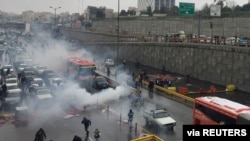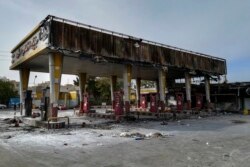Amnesty International says its documented death toll from Iran’s recent anti-government protests will rise again from the group’s latest report that at least 304 demonstrators were killed by security forces.
"That is not a final figure by any means," said Amnesty’s Middle East research director Philip Luther in a VOA Persian interview on Monday. Hours earlier, the London-based rights group had updated its death toll for last month’s Iran protests to 304 fatalities from its previous figure of 208 reported on Dec. 3.
"We think the number could rise (further)," Luther said, citing the group’s ongoing examination of “credible” reports showing Iranian security forces used live ammunition while suppressing several days of nationwide protests that erupted on Nov. 15.
"(Iranian security forces) have shot protesters with guns and they have done so in some cases when the protesters actually have been running away from them. This shows a clear intention to use lethal force," Luther said.
In its update published Monday, Amnesty said its researchers determined that Iranian authorities arrested thousands of people as part of a “vicious” crackdown following the protests to stop them from speaking out about Iran’s “ruthless repression.” It said those arrested included children as young as 15, people who participated in the demonstrations, journalists, human rights defenders and students.
The group said it had carried out interviews with dozens of people inside Iran, who described how authorities have held the detainees incommunicado and subjected them to enforced disappearance, torture and other ill-treatment.
Iran has declined to publish any official data on those killed, wounded and arrested in the November protests, which the government sparked by raising the subsidized price of gasoline by 50%.
The gas price hike further strained the finances of Iranians facing high unemployment and inflation in a shrinking economy under heavy U.S. sanctions. Tens of thousands of angry Iranians took to the streets in dozens of cities nationwide to denounce government corruption and mismanagement. Initial street protests were peaceful, but quickly turned violent as some people looted stores and set fire to buildings and security forces beat and opened fire on unarmed demonstrators.
The Iranian government has acknowledged that security forces shot and killed some people, whom it referred to as rioters, during the protests.
Patrick Clawson, research director for the Washington Institute for Near East Policy, told VOA Persian that Iran’s heavy-handed crackdown on protesters and opposition activists could backfire.
"On the one hand, the protests were put down, and that discouraged people who went out there thinking that they could effect some kind of a change," Clawson said. "On the other hand, over the last 20 years, even though each round of anti-government protests has been suppressed, the response has been for the next round to be more widespread, anti-regime and violent. That is not a good dynamic for the regime, and it’s hard to see anything that is going to stop that trend."
This article originated in VOA’s Persian Service.





